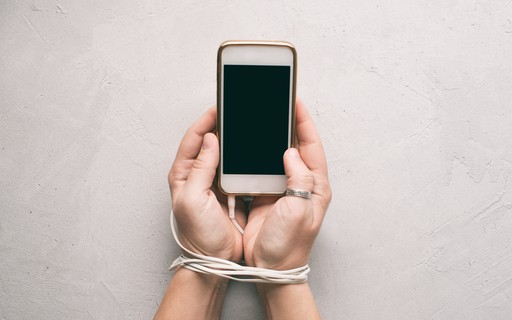(Photo: Getty Images)
Social distancing, remote working and service restrictions: The covid-19 pandemic has changed the way modern societies operate. And, of course, everyone has become more dependent on the mobile phones.
Data from a global survey in 2020 showed smartphone use increased by 70% in the first months of the pandemic. For many, devices have become routine not only as a means of social interaction, but also as a way to work, study, shop, and have fun.
It turns out that excessive interaction with cell phones also has its consequences. One of them is the nomophobia, or the phobia of being away from the smartphone – a feeling of intense anxiety triggered by the absence of the device.
The magnitude of the problem has even led scientists to advocate that the disorder be included in DSM-5, the American Psychiatric Association’s manual for diagnosing mental disorders.
An individual or a collective problem?
In an article published in The next web, Canadian researchers Anna Sui and Wuyo Sui, who are studying the issue, argue that the problem may not be just the result of the uncontrolled use of technology. They suggest that the anxiety associated with the lack of smartphones is also linked to the context in which cell phones have been used.
Scientists point out, for example, that social and work expectations are increasingly emerging from screens – which, for many, means the need for constant connection, 24/7. “It doesn’t. there is no doubt that smartphones have become an important and unquestionably irreplaceable part of everyday life, ”say the authors.
The point, they say, is that cell phone use is also part of broader social and professional norms.
“The demands of modern work, such as responding to emails and calls quickly, have been widely supported by smartphone functions and applications (such as email, video conferencing, and document editing). . The anxiety associated with smartphones (or the lack of them) stems more from these implicit demands than from the device itself, ”argue Anna Sui, from Western University, and Wuyo Sui, from the University of Canada,
More features, more time on mobile
The article also reminds us of the role of big tech company transformations in cellphones – and how those changes can make us more dependent on them. The publication points out that in order to appeal to users, smartphone ads have appealed to the creative use of devices and their role in expressing consumers’ personalities.
“Advertising for the iPhone 12, for example, focuses on how it’s the right gadget for everyone, regardless of interest and use. The ad even visually suggests that the phone never needs to leave your hands and can perform all the functions you need throughout the day, ”say the authors.
Whether on Apple’s iOS system or Google’s Android system, mobile phones are also increasingly advancing in virtual assistants and facial identification features, which increases the level of convenience, communication and utility of appliances.
According to the researchers, “we should be critical in considering how and when these devices help us, harm us and change us.”
You want to discover the exclusive content of BUSINESS season? To have access to digital version.

“Amateur web enthusiast. Award-winning creator. Extreme music expert. Wannabe analyst. Organizer. Hipster-friendly tv scholar. Twitter guru.”
